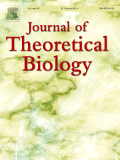 | |
| Discipline | Theoretical biology |
|---|---|
| Language | English |
| Edited by | Denise Kirschner, Mark Chaplain, Akira Sasaki |
| Publication details | |
| History | 1961–present |
| Publisher | |
| Frequency | Biweekly |
| Hybrid | |
| 2.691 (2020) | |
| Standard abbreviations | |
| ISO 4 | J. Theor. Biol. |
| MathSciNet | J. Theoret. Biol. |
| Indexing | |
| CODEN | JTBIAP |
| ISSN | 0022-5193 |
| LCCN | 64006601 |
| OCLC no. | 645600912 |
| Links | |
The Journal of Theoretical Biology is a biweekly peer-reviewed scientific journal covering theoretical biology, as well as mathematical, computational, and statistical aspects of biology. Some research areas covered by the journal include cell biology, evolutionary biology, population genetics, morphogenesis, and immunology.
Contents
The journal was established in 1961. [1] Its founding editor-in-chief was English biologist James F. Danielli, who remained editor until his death in 1984. [2] The journal is published by Elsevier and, as of 2021 [update] , the editors-in-chief are Denise Kirschner (University of Michigan Medical School), Mark Chaplain (University of St. Andrews), and Akira Sasaki (The university for advanced studies, SOKENDAI, Hayama). Lewis Wolpert served as editor-in-chief for more than 55 years. [3]
According to the Journal Citation Reports the journal has a 2020 impact factor of 2.691. [4]